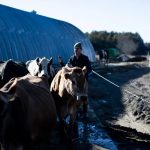
Concerned dairy farmers ask the government to slow the process of amending gene-editing laws and ‘do the analysis before getting out the red pen’.
Just last year, New Zealand Milk Products’ message to North American consumers was this: if you want non-GM milk products, don’t just look to the Non-GM label on ours, look to the country these products come from. New Zealand dairy is the gold standard for non-GM supply.
NZMP was talking about its certification by the United States Non-GMO Project – which now sees US$45 billion in annual sales in the US and Canada.
New Zealand, NZMP said, “is well recognised for its regulatory control of GMOs” and “is one of the only dairying countries in the world which has not approved release of genetically modified crops”.
As dairy farmers who help make those and other flagship products, we’re having trouble squaring that up with the fact that back here in New Zealand, the government’s proposal is to head in the opposite direction.
In December, it plans to go to Parliament with law changes that would put us at the bleeding edge of these new technologies.
It’s easy to be pigeonholed as anti-science when it comes to conversations about GMOs, so let’s get this out of the way quickly: like most farmers, we are innovative and keenly interested in science that helps us do things better for our businesses and the land. We can’t afford not to be.
But we also can’t afford to get carried away by science our customers don’t want. Our business success depends upon aligning with what our premium markets expect.
So what should farmers be worried about? Here are five things that concern us.
• The push for law change isn’t coming from our customers and consumers overseas. It’s coming from scientists who want to make it easier to get into the field to trial and release GMOs here. That should worry any business that has to face overseas markets.
Consumers mostly don’t think GMOs are safe and don’t want to eat them. That’s why we routinely have to certify that we haven’t used GMOs. There’s no problem with scientists putting forward their perspective but it’s another thing to let the science lobby hold the pen on law changes that have a direct impact on our businesses and the NZ brand.
• GMOs are still high on promise and low on delivery. We’re told we’re missing out, but let’s be honest: after 40 years, GMO production is still just a few crops of little interest to us here while new techniques like gene editing have yet to make it to market in any serious way – even in countries like the US. GM may deliver in the future and we should keep open to that, but right now, there’s little value and a lot of risk for us.
• We see no market analysis to support the law changes. When it comes to GM foods, the questions we need to ask are not just scientific ones. The issues front and centre are about our markets, supply chain integrity and brand. Yet we’ve seen no serious analysis of the markets.
Where do customers and consumers in our key markets stand on GMOs, including gene edited foods? And how would the law changes affect New Zealand’s brand reputation we’ve all worked hard to build?.
• There’s no plan to protect the supply chain. So far, all we’ve seen is some vague hand-waving that “improving agricultural assurances programmes” should do the trick. That’s simply not good enough. We dairy farmers tend to farm close together, and preventing GM ryegrass from contaminating neighbouring operations that supply GM-sensitive markets will be near impossible. And as an industry, we simply don’t need to be saddled with more unnecessary costs.
• Scientists wouldn’t need to prove they are benefitting NZ. In current law, if someone wants to release a GMO, they have to demonstrate it won’t do more harm than good. That net economic benefit test is not just a reasonable ask – it’s essential, given how much resistance to GM foods there is and how many premium market standards demand that what we produce is non-GM. But government plans to dump that, on advice from the science lobby.
Take the GM grasses that AgResearch has had in the pipeline for decades. Those grasses haven’t been trialled outdoors here. Not because the laws are too strict but because Fonterra and others pulled the plug on them.
Fonterra stated that it didn’t support GM ryegrass trials in this country and that it would only support them “if we can be convinced that this would not be perceived as a release; containment could be assessed; and that doing so would not be counter to the needs and desires of customers, consumers and key stakeholders. At this time we do not have the confidence that such criteria can be met.”
More than a decade on, those criteria have still not been met. Nothing has changed in the marketplace or the lab to make those ryegrasses less of a contamination risk. But if Crown research institutes and others get their way, they could trial GM grasses here without having to account for the economic impact on farmers, the supply chain, our premium product status or our brand position.
We can’t fathom this. Again, let’s hand the microphone to Fonterra, which last year told the government that “any changes to the law should be carefully balanced with protecting the value of New Zealand’s global reputation”. Throwing overboard the requirement to prove that a GMO release provides a net economic benefit for the country is just plain reckless.
Over the last weeks, we’ve spoken with a lot of farmers and businesses who are really worried about this but feel it’s a runaway train. It shouldn’t be. The laws should work to sustain high-value production, not undermine it, because New Zealand desperately needs our businesses to do well.
So we want the government to slow this process and do the analysis before getting out the red pen to change laws. And we want Fonterra to get out there and insist on traceability and a demonstrated net economic benefit for all GMOs with GMO users wearing the full costs of their activities.
There’s too much at stake. As Fonterra said, “once these regulations are relaxed, there is no turning back”. So let’s see some action.
By Paul Bosher, Jayne Levett, Dianna and Peter Morrison. Bosher and Levett are dairy farmers from Taupō, and the Morrisons farm in Paeroa.
You can now read the most important #news on #eDairyNews #Whatsapp channels!!!
🇺🇸 eDairy News INGLÊS: https://whatsapp.com/channel/0029VaKsjzGDTkJyIN6hcP1K

























